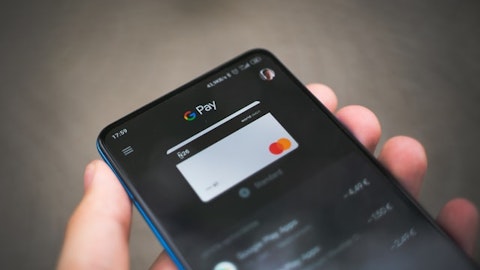Mihir Bhatia: Got it. And then maybe switching gears to the debit product that was relaunched. Can you talk just longer term strategically, what is the, I guess, the thinking behind that product, what is the goal, is the idea there, this is — the opportunity to deepen relationships with customers and lower and how will that benefit you? Will it be through better NIM because if they’re offering rewards, you can — you don’t necessarily need to offer as higher interest rates? Like, just talk a little bit more strategically about why the product makes sense to invest in for Discover and how you expect the growth trajectory of that product to go over the next few quarters here?
Roger Hochschild: Yeah, great question. So, our aspiration is to be the leading digital bank. And so when you think about a digital bank, you think about the core DDA or debit product. And because we have a proprietary network, we can offer rewards in debit in a way no other large bank can. And it builds on our heritage around cashback and as the inventor of credit card rewards. So it’s not just to cross-sell to our card customers. We think that this can pretty quickly become a significant entry point into the franchise for new customers. And then over time, much as we’ve done on the card side, if you can provide a superior value proposition and customer experience, they will want to buy other products from you whether that’s a savings account and savings accounts where you also have the checking account and to have a lower beta or the card product.
So again, a very important initiative for us, I think over time, will help continue transforming Discover. And we’re excited for the potential and you’ll see significant marketing against it this fall.
Mihir Bhatia: Got it. And then just my last question. Just coming back to the compliance issue, look, I appreciate it’s difficult provide too many details right now. But maybe just on the timing, give us some frame of reference, like, given that this is — it sounds like the FDIC consent order also is related to compliance issues. You have the student loan issue. Now you have this issue. Does that entail a much longer review period or do you think this can go pretty quickly here like a quarter or two to go through? Again, I’m not saying when you resume buyback but at least like when you expect the review to be complete, what are you trying to — how quickly are you trying to complete the review internally? And then I understand maybe the buyback discussion probably involves regulators and could be — it’s a little bit harder to cite. But at least the review maybe you can tell us, what your target is for like when you’re trying to complete the review?
Roger Hochschild: Yeah. And to frame the compliance issue, I would not over-focus on the regulatory portion. This is something where we as a team know we are not where we want to be and it is our top priority. So it is aligned with the views of the regulators, but our focus is taking many forms, from simplifying our architecture, automating manual processes, streamlining and standardizing business processes, bring on some great new talent as John talked about into the firm. And we know that the result will not just be better compliance but a better customer experience and more efficient organization. So the regulatory piece is important, but I would say what most — is most important is the commitment from me, the team, the Board on achieving excellence in this area.





